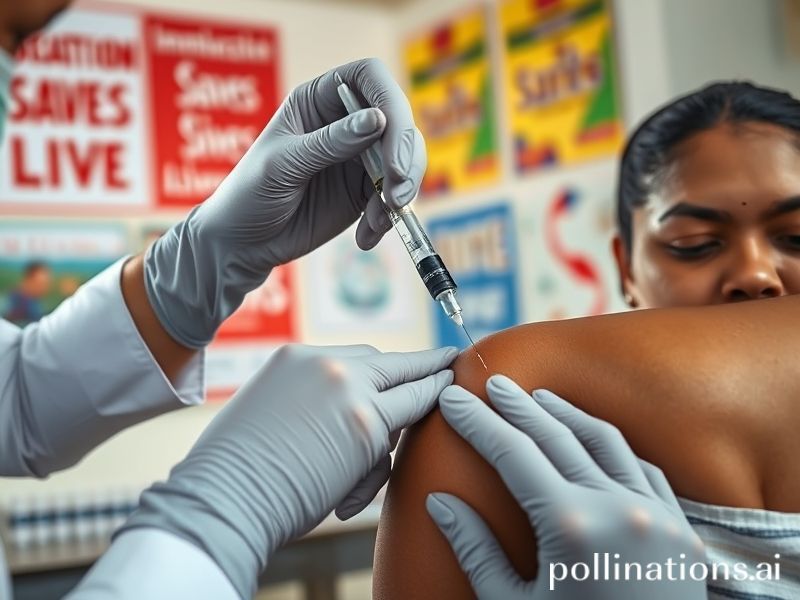Needles & Nations: The Jet-Setting Life of Vaccines in a World That Can’t Queue
Somewhere over the international dateline, a refrigerated crate labeled “Pfizer/BioNTech” is doing the sort of jet-lagged shuffle most of us only perform after an ill-advised red-eye to Bangkok. Inside are 3,200 doses that left Belgium last Tuesday, paused in Dubai to admire the duty-free chocolate, and are now bound for a provincial clinic in Papua New Guinea where electricity is a rumor and the nearest freezer is a repurposed ice-cream tub. This, dear reader, is the glamorous life of a 21st-century vaccine—part passport, part diplomatic chess piece, part get-out-of-pandemic-jail card that half the planet wants to collect like Pokémon while the other half would rather believe it’s a 5G-enabled Bill Gates mind-control smoothie.
The global rollout has become the world’s most expensive game of musical chairs, except the chairs are refrigerated trucks and the music is a remix of national anthems remixed by bureaucrats. The European Union now ships surplus doses to Africa with the same solemnity medieval popes once dispatched indulgences: here’s salvation, now please remember us at the next WTO meeting. Meanwhile, China’s Sinovac lands in Belgrade with the subtlety of a Beijing billboard, wrapped in red-ribbon diplomacy and the unspoken footnote: “We may also be interested in your 5G contracts.” Russia’s Sputnik V, having received more international stamps of emergency approval than a diplomat’s passport, continues its triumphant tour of Latin America—though cynics note the vaccine’s real export is nostalgia for a time when Moscow could still throw a geopolitical punch without tripping over its own sanctions.
Not to be outdone, the United States has discovered the joys of vaccine nationalism after decades of lecturing the planet on free markets. Having bought enough mRNA for every American to bathe in booster shots like Gatsby in champagne, Washington now dispenses charitable dribbles via COVAX—the bureaucratic equivalent of tipping the valet with a Subway coupon. “Sharing is caring,” murmurs the State Department, while quietly ensuring the intellectual-property waiver debate stays trapped in Geneva like a pensioner in a revolving door.
The moral arithmetic is exquisite. One AstraZeneca dose costs less than the average Londoner spends on sourdough each week, yet in Kampala it can buy a family another planting season. In Switzerland, an octogenarian shrugs at dose number four—“I’m just being prudent”—while in Myanmar a doctor reconstitutes expired vials beneath a tarp because the junta spent the health budget on bullets and Facebook ads. The WHO’s target of 70 % global coverage by mid-2022 has been downgraded from aspiration to punchline; at current rates, we’ll reach it around the same time Elon Musk colonizes Pluto.
Human nature, ever the reliable punchline, has responded with predictable creativity. There’s the thriving black-market trade in counterfeit QR codes in Moscow—because nothing says “trust the science” like a QR tattooed on your forearm by a guy named Sergei. In France, vaccine passports have inspired more forged documents than a teenager’s fake ID, prompting the government to deploy AI scanners that can apparently detect Gallic existential dread in the pixels. Down under, Australia briefly detained Novak Djokovic for insufficient paperwork, proving that even tennis can mutate into a contact-tracing sport.
And yet, for all the absurdity, the needle moves—literally. Chile now boasts 90 % coverage and a per-capita death rate lower than Liechtenstein’s. Tiny Bhutan vaccinated 85 % of its adults in two weeks, a logistical feat that would shame Amazon Prime. Even in the United States, where the pandemic somehow became a culture-war halftime show, uptake in Republican counties is quietly creeping up—nothing motivates like watching your neighbor’s GoFundMe for funeral expenses.
The broader significance? Vaccines have become the first truly global currency since gold, only this time the vault is minus 80 °C and the speculators wear lab coats. They are passports, propaganda, peace offerings, and profit centers all at once. In short, they are us: brilliant, bungling, self-interested, occasionally altruistic, and terminally unable to queue without elbowing someone. The virus will retreat eventually—viruses, like houseguests, grow bored—but the refrigerated choreography now etched into the planet’s muscle memory will linger. Next time the microbes come knocking, we’ll at least know which cargo hold to book.







